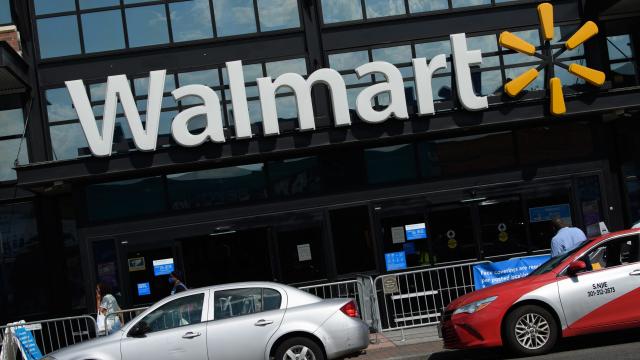The uncool bidders for extremely cool video app TikTok now reportedly include, uh, American retail chain, Walmart.
TikTok’s Chinese owner ByteDance is exploring options to offload the app, which is based in the US, amid threats by Donald Trump’s administration to somehow “ban” it if control isn’t transferred to a U.S. company. Per the New York Times, Walmart has apparently offered to join forces with Microsoft for a shared acquisition that would see both companies as the new co-owners of the app’s operations in the US, Canada, Australia and New Zealand. Offers have been floated in the $US20 ($28)-50 billion range, though that will ultimately depend on what the agreement actually entails and the likeliest sale price is somewhere in the middle.
Microsoft isn’t exactly the hippest tech company in town, and news that budget retailer Walmart might consider buying a video app might initially seem baffling. But the arrangement may make more sense than it sounds. Microsoft has largely taken a hands-off approach to some of its other acquisitions such as business social network LinkedIn and software development community Github, so it’s likely Microsoft isn’t interested in interfering too much with TikTok’s operations. The New York Times noted that outside of its Xbox division, Microsoft is mostly focused on hardware, productivity software, and cloud services for the business market. That might make a Microsoft acquisition a softer sell to antitrust officials than if it were offloaded to Amazon, Facebook, or Google, which are currently facing regulatory scrutiny for expanding into every market under the sun.
Microsoft would gain control not only of one of the most popular apps in the U.S., immediately making it a major player in social media, but a torrent of data on how TikTok’s coveted younger demographic engages with technology. Microsoft infamously squandered its opportunity to lead the mobile revolution, and that data could help inform Microsoft’s efforts to regain some edge in mobile hardware (like its HoloLens AR goggles) and software (such as video creation tools). Microsoft could also use TikTok to promote products like its Surface laptops or the Xbox Series X, which is launching in just a few months.
Walmart’s interest in TikTok is likely more nakedly utilitarian. It’s been trying very hard to catch up to Amazon in e-commerce, relying heavily on Microsoft cloud services to do so. It could use TikTok to gather data on the purchasing habits of young people and to aggressively promote Walmart’s online marketplace via in-app ads. And, as the Times noted, Walmart owns streaming video service Vudu, which has ads that allow users to add items to their shopping carts without ever leaving the page.
That’s not to say anyone should be excited about a possible deal other than the Trump administration, and Microsoft and Walmart shareholders. Trump’s efforts to strong-arm ByteDance into selling to a U.S. firm has been justified entirely on the pretext it poses a security risk — though that risk has likely been exaggerated and the real motivation may be the White House’s view of US-China relations as a zero-sum game where one country’s loss is the other’s gain and vice versa. Trump has also set another precedent for unadorned corruption with his demand that the U.S. Treasury get a cut of the sale price for facilitating the deal (read: providing the muscle for an extortion attempt).
TikTok is currently suing the Trump administration to stop the ban, claiming it “failed to follow due process and act in good faith, neither providing evidence that TikTok was an actual threat, nor justification for its punitive actions.” Its CEO Kevin Mayer quit on Thursday, citing the hostile political environment and saying his role would no longer resemble the job he signed up for after a sale.
Banning TikTok may not in fact be possible. Any attempt to do so would be tantamount to censorship and could help further fracture the global internet into protectionist fiefs. Beyond that, a TikTok purchase would be one more consolidation in a tech industry that is already stretching the boundaries of antitrust law to the breaking point, even if the the way U.S. antitrust law is currently interpreted makes it unlikely regulators would intervene in a TikTok-Microsoft-Walmart deal. As Recode noted, the U.S. spent years trying to break up Microsoft’s abusive monopoly of the operation system market in the 1990s. A Microsoft and Walmart acquisition would cede control of the most influential social media app to emerge in years to companies that respectively made $US44 ($61) billion and $US14.88 ($21) billion in net income in their 2020 fiscal years.
Other contenders include cloud and enterprise software giant Oracle, which reportedly gave ByteDance an offer of $US10 ($14) billion cash, $US10 ($14) billion in stock, and 50 per cent of all TikTok profits on Thursday. Just why Oracle is pursuing a deal beyond the fact that it can remains somewhat unclear, though the company’s Data Cloud division has stockpiled billions of consumer profiles for use in ad targeting. Co-founder, chairman, and largest shareholder Larry Ellison as well as CEO Safra Catz are Trump flunkies who may well just see a ripe opportunity to cash in on their political connections. Ellison held a $US7 ($10) million fundraiser for Trump this year, while Catz actually worked on Trump’s transition team.
Discussions with Google parent company Alphabet and Twitter are now seen as dead in the water, according to the Wall Street Journal.
